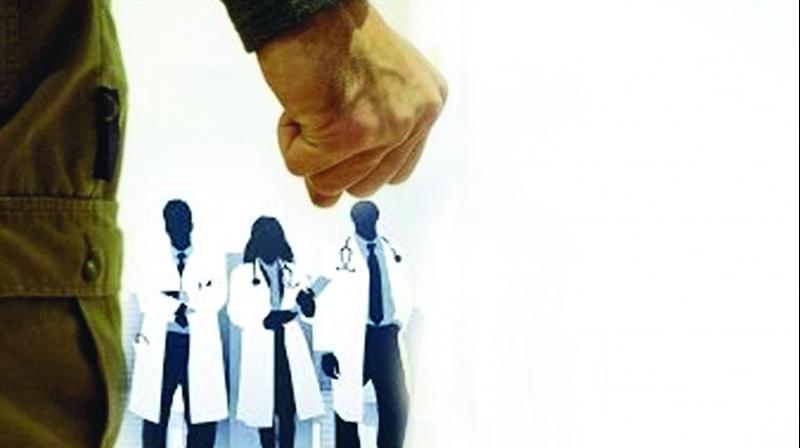Many doctors face ire of patients and kin

Hyderabad: Three out of four doctors have faced the threat of violence — either physical or verbal — from patients or relatives during the course of their work, according to a survey carried out by the International Institute of Health Management Research (IIHMR) and the Indian Medical Association (IMA). About 12 per cent of them were subject to physical assault.
The survey found that 75 per cent of doctors faced verbal abuse, which is the most common form of violence and 51 per cent complained of threats.
Those who were physically assaulted stated that they felt angry, frustrated and scared. They also felt fatigued and suffered from low self-esteem thereafter. The survey was published in the National Medical Journal of India.
The survey found that most of the attacks on doctors occurred during peak hospital hours, emergency medical interventions or post-surgery.
It found that patients and their relatives often get frustrated due to lack of coordination between the hospital administration at the time of admission, delay in attending to the patient, demand of advance payment, withholding of the dead body pending final settlement of hospital bill and unethical practices by certain doctors.
The situation at hospitals is becoming risky as physicians, however conscientious or careful, cannot tell what day or hour a patient or his relatives would resort to malicious accusation, blackmail or file a suit for damages.
The survey found that patient’s lack of understanding of technical matters, unreasonable high expectations and high cost of healthcare were some reasons that the patient and their relatives resorted to violence against doctors.
Dr Sanjiv Kumar, director of IIHMR, said, “There are 156 laws applicable to hospitals, but it is not the remedy to bridge the trust gap between medical professionals and public. Doctors need to introspect their conduct as sensitivity is one of the most important factors in dealing with emergency cases and those being treated in intensive care units. The relatives have to be handled with care and the hospital unit must not demand money at every stage.”
Prof. A.K. Agarwal, who was a part of the survey, said, “There is a need to understand behavioural issues that govern relatives. This requires appropriate management by the hospital administration. The doctor-patient communication must be clear and transparent. Doctors must not make tall claims and critical issues must be properly explained to the patients and their relatives. One person from among the patient’s relatives should communicate with the doctor. Too many relatives make things difficult for doctors.”
Loss of a near one
- The Indian Medical Regulation 2002 sets down the following actions to be taken on daily basis for prevention and regulation of violence against medical professionals:
- Proper record-keeping of every patient.
- Patient’s grievance should be redressed with the utmost care. A separate committee can be formed for the same.
- Information should be displayed in the hospital that any violence or similar activity on the premises is a punishable offence.
- Transparency regarding the hospital, staff and the treatment should be followed.
- Proper coordination with the local and state medical associations necessary.
- False promises should be avoided at any stage of the treatment.
- Immediate police complaints should be made at the time of violence with evidence.

